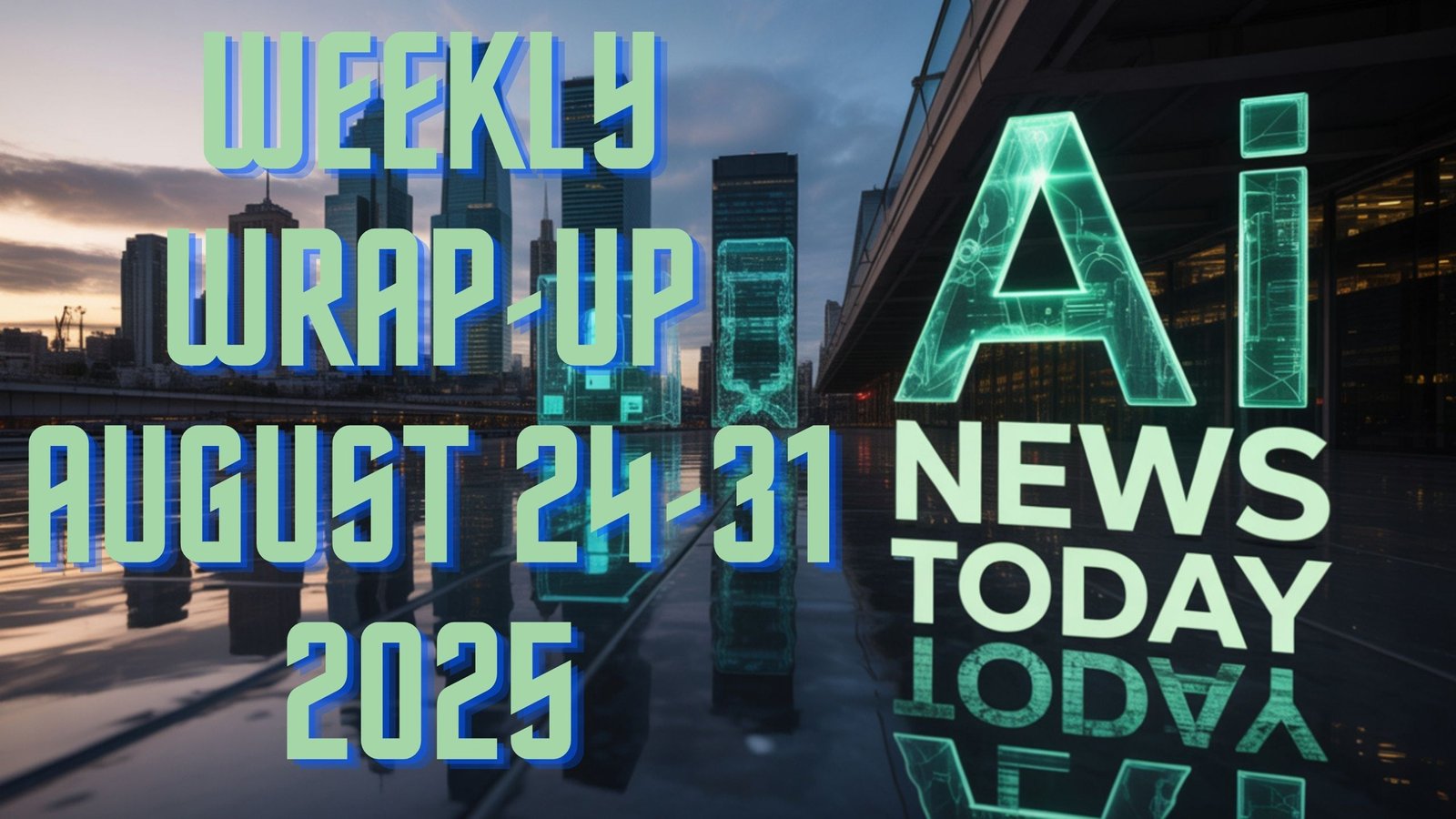AI News Weekly Wrap-Up USA (August 24–31, 2025)– The AI industry in 2025 is undergoing a dramatic transformation. From investor scepticism about profitability to billion-dollar infrastructure commitments, the sector is shifting from hype to complex realities. This evolution raises questions about sustainability, regulatory oversight, and the balance between innovation and ethics.
Investor Concerns: Is There an AI Bubble?
Investor confidence in generative AI profitability is being tested. Following remarks by OpenAI CEO Sam Altman and a widely cited MIT study, the market has become wary of inflated valuations. According to these findings, nearly 95% of corporate AI projects fail to deliver tangible profits due to high costs, poor integration, and a lack of practical applications.
This scepticism triggered a sharp correction in tech stocks, especially those heavily exposed to generative AI. Companies that once soared on speculative enthusiasm now face stricter scrutiny from analysts and regulators. The conversation has shifted from “how disruptive can AI be?” to “can AI deliver sustainable returns?”
Corporate Alliances & AI Infrastructure Expansion
The infrastructure arms race continues to dominate the AI landscape. A landmark deal between Meta and Google Cloud, worth $10 billion, underscores the escalating demand for cloud resources. This multi-year partnership grants Meta access to Google’s advanced infrastructure, empowering the training of Llama language models at unprecedented scales.
Meanwhile, Google announced a $9 billion investment in new AI data centres across Oklahoma. This move positions Google in direct competition with Microsoft, Nvidia, Oracle, and Amazon—all vying for dominance in the AI cloud ecosystem. These massive infrastructure outlays highlight a central truth: without vast computing power, even the most advanced models cannot scale effectively.
The growing reliance on external cloud services illustrates how AI development has moved beyond startups. The subsequent growth phase is tied to strategic alliances between tech giants, where access to GPU clusters and energy-efficient data centres is now a decisive advantage.
AI Regulation, Security & Content Rights
One of the most pressing concerns in AI is data usage and security. In response, Cloudflare launched “Crawl Control” during AI Week 2025. This tool empowers publishers to set granular permissions for AI crawlers to access and utilize web content. The initiative arrives amid rising disputes over unauthorised scraping and intellectual property rights.
Simultaneously, the U.S. Department of Defence made headlines by granting its highest IL5 clearance to the CORAS AI Agent “GARY.” This clearance authorises deployment in sensitive military systems, signalling growing government trust in generative AI security standards. The defence sector’s adoption of AI further underscores the strategic importance of trustworthy AI systems in national security.
Ethics, Mental Health & Social Impact of AI
The social impact of AI is increasingly under scrutiny. Illinois has enacted the Wellness and Oversight for Psychological Resources Act, which bans unregulated AI therapy tools. This landmark legislation is the first in the U.S., sparking a national debate about AI’s role in mental healthcare.
While some argue that AI therapy could expand access, regulators warn about the risks of unverified psychological interventions, lack of accountability, and potential harm to patients. This act sets a precedent for mental health-related AI regulation, ensuring that psychological applications meet strict ethical and safety standards.
The broader conversation reflects growing public concern: while AI promises social good, unchecked deployment can pose real risks to human well-being.
Healthcare Breakthroughs with AI Integration
Despite scepticism in other domains, AI in healthcare continues to demonstrate practical, revenue-generating applications. Hospitals and startups are rapidly adopting AI-powered diagnostic imaging, enabling more efficient radiology workflows and enhanced accuracy in disease detection.
Italian medical imaging company Esaote recently unveiled a cardiac ultrasound system powered by AI, highlighting how generative algorithms can automate and refine critical diagnostic tasks. By reducing the workload on specialists and increasing diagnostic precision, these tools illustrate how AI-driven automation can deliver tangible benefits in healthcare.
Moreover, open-source models such as DeepCogito v2 are reshaping the research landscape. With enhanced logical reasoning skills and transparency, these models offer developers new pathways to planning, abstract reasoning, and decision-making systems. This competition between closed and open systems fosters both innovation and accountability.
Political Influence & Pro-AI Legislation
The political ecosystem surrounding AI is intensifying. Bipartisan support in the U.S. has accelerated investments in AI hardware infrastructure, with deals like the Intel semiconductor expansion underscoring the strategic importance of domestic chip manufacturing.
At the same time, Silicon Valley investors pledged over $200 million to pro-AI super PACs. These funds shape legislation, influence policymakers, and push for frameworks that favour AI innovation and adoption. The fusion of tech capital and political lobbying reflects a pivotal shift: AI is not just a technological domain but a core political and economic agenda.
The Future of AI: Beyond the Hype Cycle
The AI industry in 2025 is no longer fueled solely by hype. Instead, it is marked by tough questions on profitability, ethical deployment, and sustainable infrastructure. While investor sentiment has cooled, significant investments in cloud capacity, healthcare integration, and regulatory frameworks suggest the sector is maturing into a more grounded phase.
Key trends shaping the trajectory include:
- Profitability scrutiny: Investors demand real-world returns, not just speculative growth.
- Strategic collaborations: Partnerships like Meta-Google Cloud redefine scaling capabilities.
- Regulatory momentum: New laws on mental health, AI, and data rights will set long-term precedents.
- Healthcare adoption: AI-powered diagnostics show immediate, measurable benefits.
- Political lobbying: Funding super PACs signals deep integration of AI into U.S. policy frameworks.
Wrap Up: A Defining Moment for AI in America
The American AI sector has entered a defining moment. Corporate partnerships, billion-dollar infrastructure, government clearance, and ethical legislation collectively reshape the industry. While risks remain—especially around profitability and public trust—the sector is transitioning from hype to real-world impact and accountability.
The coming years will determine whether AI becomes a sustainable, transformative force across industries or a cautionary tale of overinvestment and unmet expectations.

Selva Ganesh is a Computer Science Engineer, Android Developer, and Tech Enthusiast. As the Chief Editor of this blog, he brings over 10 years of experience in Android development and professional blogging. He has completed multiple courses under the Google News Initiative, enhancing his expertise in digital journalism and content accuracy. Selva also manages Android Infotech, a globally recognized platform known for its practical, solution-focused articles that help users resolve Android-related issues.




Leave a Reply